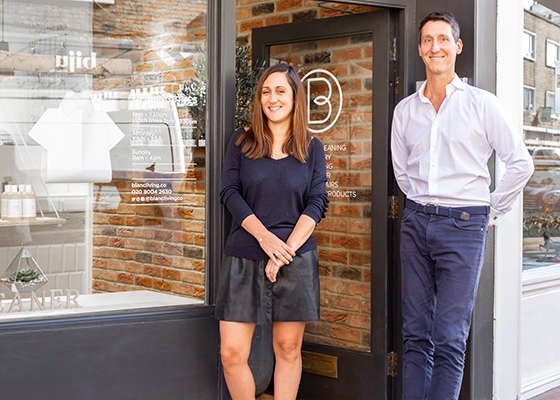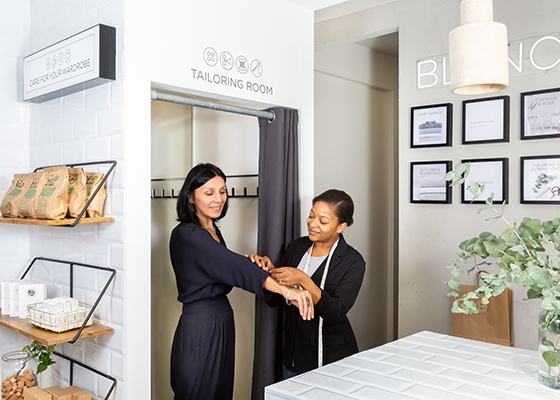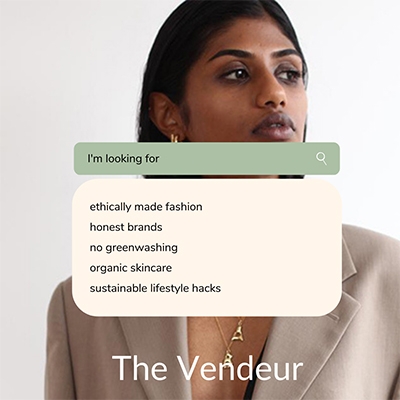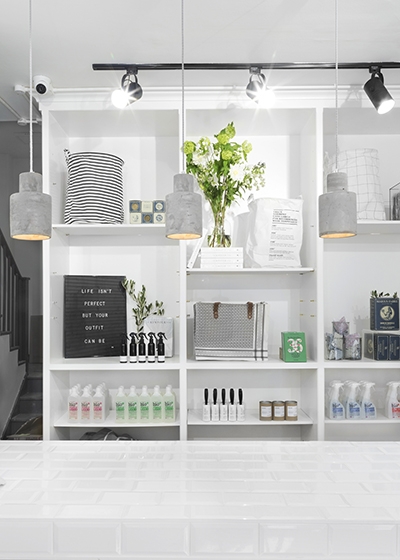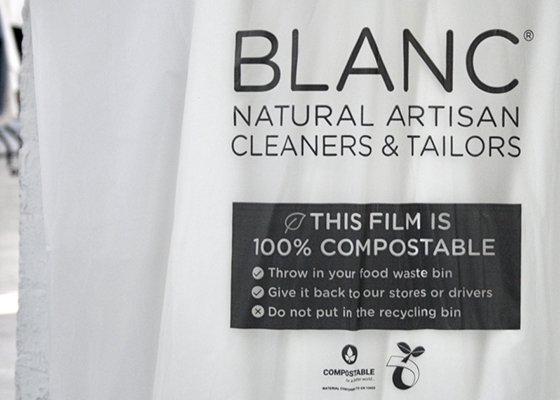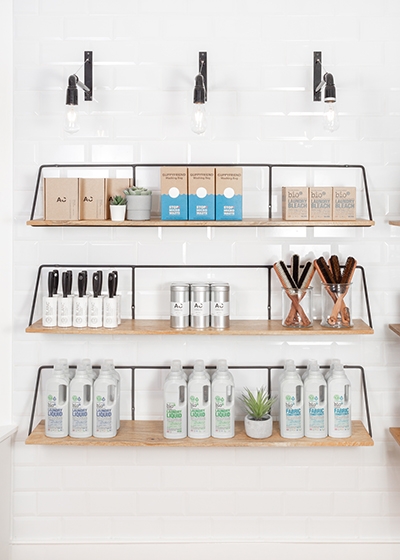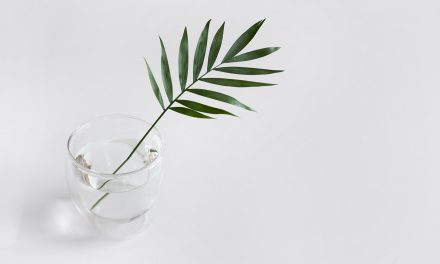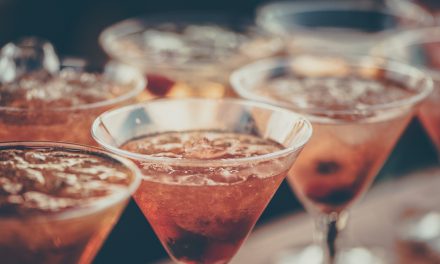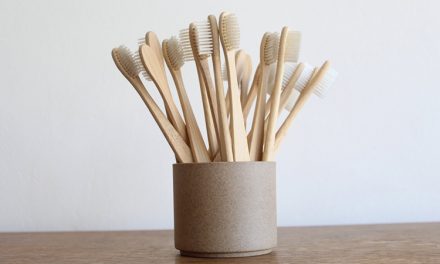10 Questions for Ludovic Blanc Founder of Blanc
All Images: BLANC
Aftercare is crucial for keeping our clothes in our wardrobes for longer. BLANC are changing the way we clean our clothes. We spoke to Ludovic Blanc about cleaning up the cleaning industry.
As the conversation around the negative impact of our wardrobe grows, clothing aftercare has become a big topic. Washing and dry cleaning our clothes creates a huge need for energy and water. Did you know that 90% of the energy used by a washing machine is used to heat up the water, and only 10% is used to power the motor? Not only that but the chemicals used in our laundry detergents as well as dry cleaning are not good for our waterways. Add to this the threat of microplastic pollution from washing synthetic fabrics and the picture is looking decidedly grim.
However, aftercare has been identified by sustainability evangelists like Orsola de Castro, as crucial to keeping out clothes in circulation for longer. After all, ‘the most sustainable garment you own is the one already in your wardrobe.’ So eco friendly aftercare options have become more popular as we look for ways to reduce our impact, whilst keeping our clothes in tip top condition. Enter BLANC, the eco friendly neighbourhood dry cleaner. We spoke to Co Founder Ludovic Blanc about his passion for the Earth and how he and his partner are addressing the ugly side of dry cleaning, so you can clean with confidence.
The Vendeur: Why did you decide to create BLANC?
Ludovic Blanc: There were a few reasons. During my banking years, I had been a heavy, rather discontented user of dry cleaning services. Then, in 2010, I read that the solvent used to dry clean clothes was highly toxic both for personal health and for the planet. It was then that I decided that I needed to take action, roll up my sleeves and make some tangible change. I wanted to do my best to remove the toxicity from this industry. From that point, I started working on developing this vision with Mathilde, my wife and co-founder for the next year and a half. We launched BLANC in 2013. Fast forward to today and BLANC cleans over 1,000 clothing items per day with a dream team of 50 colleagues for over 20,000 customers! We have partnered with more than 100 fashion brands or online platforms, who trust us to care for clothes, sustainably, and always with love.
TV: Where did your passion for creating a more eco aware cleaning company come from?
LB: It surely comes from my personal life, my parents are my absolute inspiration. I was raised to want better for our planet, to be the change I wanted to see in the world. And also to place the respect of nature and others above our selfish interests. So I have always been aware of climate change and the need to do my bit, to leave a better planet behind for my children. In my professional life, before BLANC, I was a member of the JP Morgan European Environmental committee. However as time passed, I felt I needed to do more. This continued to fuel my passion.
TV: What issues in the current clothing cleaning industry were you trying to focus on?
LB: From BLANC’s inception we have focused on the aftercare. Getting clothes clean without toxic products, and prolonging the clothes’ lifespan after the act of purchase. We ensure that garments live as long as possible, through not only eco-cleaning but also repair and alterations. Both methods help to close the loop of circular fashion. Progressively, we have developed a very close relationship with a growing pool of clothing designers so that we can support them upstream too. We work hand-in-hand to help them develop clothes that are going to be wet cleanable, and more importantly are going to last.
Plastic pollution is another issue we are trying to tackle, and it’s known to be a major issue in the fashion industry. We’re talking about plastic packaging of course. We have recently replaced our plastic coverings with a 100% home compostable alternative . However we are also addressing microplastics, which are the hidden plastics released into the environment when synthetic clothes are cleaned. To combat this, BLANC is trialling industrial filters on our machines. This means we will soon be able to capture these microfibres before they get washed away into oceans and onto beaches. Microplastics are highly damaging for both wildlife and the environment.
Enjoying this article?
Then you'll love our Newsletters. At the beginning of each month, we send you the low down for the month ahead, featuring news and our favourite responsible products and brands you need to know about. And whats more, you receive all of this direct to your inbox before anyone else.
TV: Can you tell us more about the Wet Cleaning and Liquid Co2 techniques you use in place of traditional methods. How do these compare to dry cleaning?
LB: Traditional dry cleaning uses a chemical called Perchloroethylene, or ‘PERC’, which is known to be toxic and carcinogenic. It has been banned in many countries already, including France, Denmark and many states of the US. Several solvents have been developed more recently which are better, but still toxic. All the cleaning technologies we use here at BLANC, from wet cleaning to liquid CO2 cleaning and Ozone disinfection, provide a higher quality finish. They do not require the use of any of the toxic chemicals found in traditional dry cleaning. Our process combines artisan care with expert tech. Each step of the process is optimised to lower the environmental impact, from the biodegradable detergents we use, to the cleaning cycles. Everything is optimised to clean at lower temperatures too.
TV: You also provide a laundry service which utilises tumble drying, how do you make this as eco friendly as possible?
LB: Our tumble dryers use the latest technology available. Our team have calibrated the programs to reduce energy usage and deliver high quality results for any laundry or delicate items processed in our Atelier. These dryers are energy efficient and pre-programmed to stop as soon as the set moisture content is reached. This optimises the finish and avoids the overdrying of fabrics. Our latest machine is highly optimised and re-uses the heat exhausted as part of the process to minimise further the energy consumed.
TV: Why is single use plastic such an issue in the clothes cleaning industry?
LB: The dry cleaning industry is all about cleanliness so wrappings and packaging are sadly unavoidable. They help to keep the freshly-cleaned clothes dry and stain-free from the moment they leave our Atelier until they get delivered to our customers. Most dry cleaners use plastic film called “poly wraps”. However those plastic covers have a high environmental impact considering that even if they are technically recyclable, they can’t be recycled at home in the UK. They need to be taken to a carrier bag collection point. This is why, within the last few years, we have led the way in reducing the use of single-use plastic. Last February, we finally made this vision a reality and eliminated all single-use plastic from our Atelier operations.
TV: How long did it take to develop the new compostable films and what is special about the product?
LB: We are the first dry cleaners in the UK (and Europe, I believe!) to have entirely replaced the plastic poly wraps with fully compostable ones. It took over 2 years of R&D to get it right. It was challenging to find a packaging supplier willing to take this mission on and it represented a big investment for a business our size. The challenge was to be able to use such compostable packaging on a fully automated packaging machine so we are very proud to have made the switch. Our new 100% home compostable bags are made from potato starch. They have the same protective qualities as the original plastic bags, just with a much lower environmental impact! Plus they can also be re-used as food bin liners, which we love.
TV: Can you explain what you are hoping to achieve with the new industrial microplastic filter on your machines?
LB: According to Ellen MacArthur Foundation, around half a million tonnes of plastic microfibres a year contribute to ocean pollution. These tiny fibres shed off synthetic garments every time they are washed and pollute the oceans and waterways. As the leading aftercare specialist in the UK, we take this issue very seriously and are working on installing filters on all our cleaning machines. Our goal is to get to a point where the wastewater leaving our Atelier at the end of the process is 100% harmless. Our impact is already minimal since we are using biodegradable detergents and do not release harmful chemicals so the next step is to get rid of all microplastics too. We are still in the trial phase at the moment but we can’t wait to share more and to be pioneering yet another element of our sustainability journey.
TV: In what other ways does Blanc try to eliminate plastic waste in the company?
LB: As part of our switch to zero single-use plastic in our Atelier Operations, we have managed to reduce our overall packaging requirements by a whopping 25%. We’ve done this by reducing the thickness and quantity of packaging. Of course we really feel quite good about this! We have also put a lot of effort into training all our employees about how to recycle properly because it’s sometimes trickier than you would think. We’ve also have equipped our kitchens so that all employees can get cutlery, mugs etc. without having to use disposable plastic ones. We now have food compost bins in our kitchen too.
TV: How do you hope the landscape of professional cleaning will look in 5 years time?
LB: I truly hope for eco-cleaning to become the norm. The government should also define and enforce terms and certifications to ensure dry cleaners can’t advertise as “green” or “environmentally friendly” when their process is not safe for the Earth. PERC should be completely banned. It has disastrous effects on people working in the cleaning facilities, on customers, not to mention it is a strong water, air, and soil pollutant.
Did This Put A Smile On Your Face? Why Not Subscribe?
If you enjoyed this then theres plenty more on our email newsletters that you'll love. Whether you're a sustainable newbie or an eco conscious pro, our bi monthly emails will inspire you to live sustainably and ethically.
Disclaimer: The people and models in the images featured are not associated with The Vendeur and do not endorse it or the products shown. This post may contain affiliate links. Prices correct at time of publishing.

